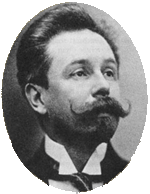Piano Sonata No. 5 (Scriabin)
The one-movement 5th Piano Sonata op. 53 by the Russian composer and pianist Alexander Scriabin (1872–1915) was composed in 1907.
Emergence
The 5th Piano Sonata op.53 was composed at the end of 1907, despite the lower number of opus, shortly after the orchestral work Le Poème de l'Extase op.54 had been completed. The inner connection between the two works is clear from the fact that Scriabin added the musical text of the sonata (which he initially also referred to as “Poem”) was preceded by a motto that comes from the extensive poem Le Poème de l'Extase , which was written in close connection with his op. In the translation of the French original it reads:
- I call you to life
- Hidden Aspirations!
- Your in dark
- Depths of the creative
- Mind lost,
- You fearful germs of life,
- I bring you boldness.
Since Scriabin was of the opinion that his previous main publisher, the music publisher MP Belaieff , paid him too low fees, the 5th Sonata was self-published in addition to other piano pieces of this time (but he soon came back from this due to the high expenditure and financial losses Procedure from). The first performance of the 5th piano sonata took place on November 18, 1908 in Moscow by the pianist Mark Meitschik .
characterization
The one-movement sonata called Allegro. Impetuoso. Con Stravaganza lasts about 11 to 12 minutes.
The 471-bar work is based on an expanded sonata form . The usual sequence (exposition, development, recapitulation) is preceded by a prologue with its own thematic material, which is also taken up in the development. The first prologue motif, a trill configuration that begins in a lower register and that leaps up to the piano treble in increasing accelerando , again concludes the work.
The self-confident gesture of the sonata with call-like and signal-like motifs - there are also lyrical, longing ( languido ) passages - is underlined by performance terms such as “imperioso” , “quasi trombe imperioso” , “presto giocoso” or “estatico” . It is also the last of Scriabin's ten (numbered) piano sonatas, the key of which (F sharp major) can still be guessed from the accidentals.
Individual evidence
- ↑ Alexander Scriabin: Le Poème de l'Extase (poetry). Übers. Ernst Moritz Arndt. Russian Propylaea, Vol. 6. Geneva 1906, Moscow 1919.
literature
- Igor Fjodorowitsch Belsa: Alexander Nikolajewitsch Scriabin . Verlag Neue Musik, Berlin 1986. ISBN 3-7333-0006-8 , p. 166.
- Christof Rüger (ed.): Concert book piano music A-Z . VEB Deutscher Verlag für Musik, Leipzig, 3rd edition 1988, p. 692/693
- Sigfried Schibli: Alexander Scriabin and his music . Piper, Munich / Zurich 1983. ISBN 3-492-02759-8 , pp. 180-187
- Michael Schmidt : Composition as a symbol - reflections on Scriabin's Fifth Piano Sonata op.53 . In: Aleksandr Scriabin and the Scriabinists II . Music Concepts 37/38 (Eds. Heinz-Klaus Metzger and Rainer Riehn ), edition text + kritik , Munich 1984, pp. 44–52. ISBN 3-88377-171-6 .
Web links
- Scriabin: 5th Piano Sonata : Sheet Music and Audio Files in the International Music Score Library Project
